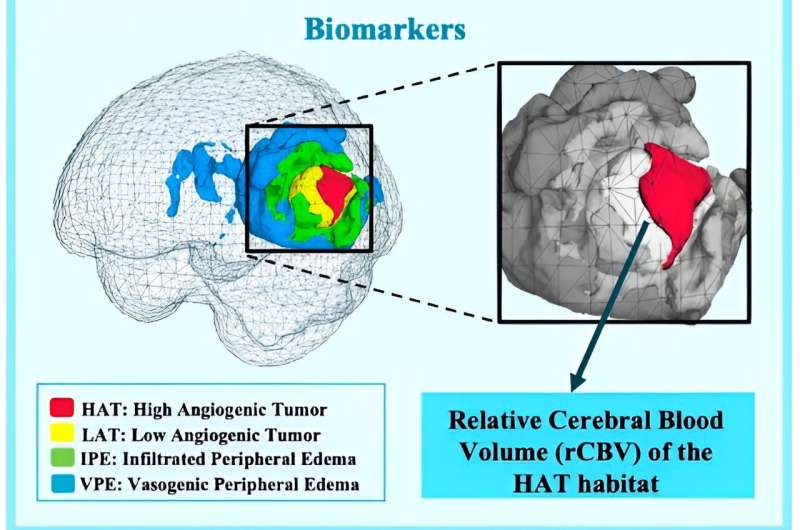This article has been reviewed according to Science X's editorial process and policies. Editors have highlighted the following attributes while ensuring the content's credibility:
fact-checked
proofread
Research opens up a new approach for improving personalized treatment of patients with glioblastoma

A recent study opens up a novel approach for improving personalized treatments for patients with glioblastoma, one of the most aggressive types of cancer in existence today.
The application of these results in clinical practice, published in the journal Cancers, has the potential to tailor therapies to the specific characteristics of each brain tumor.
The research focused on evaluating the efficacy of bevacizumab (BVZ) in treating glioblastoma (GBM). This drug is designed to inhibit the formation of new blood vessels in the tumor. However, according to Dr. María del Mar Álvarez-Torres from the Universitat Politècnica de València, the efficacy of this treatment has been questioned due to its inability to enhance survival in all patients who undergo the therapy.
"The variability in patients' responses has raised questions about the generalized usefulness of this drug in this aggressive form of brain cancer. In this work, we propose using cerebral blood volume (rCBV) as a predictive marker to identify those GBM patients who could benefit from this treatment in terms of survival," says María del Mar Álvarez-Torres.
In their study, the team from the UPV, IGTP, ICO and Clínic de Barcelona carried out a retrospective study involving more than 100 patients. Bevacizumab (BVZ) was more beneficial in patients with moderately vascular tumors, with a median survival time of 10 months longer after treatment. This suggests that initial tumor vascularity may be an important indicator in predicting who would benefit most from bevacizumab after tumor progression.
"In our research, we discovered that the incorporation of the rCBV marker allows us to precisely identify those patients with moderately vascularized tumors who would benefit more from bevacizumab treatment. This enhancement in treatment efficacy not only provides a more targeted approach but also opens avenues for exploring more favorable options for patients whose tumors do not respond positively to the drug. This optimized approach aids in resource management and contributes to improved clinical outcomes," explains María del Mar Álvarez-Torres.
The rCBV was calculated from magnetic resonance images using an artificial intelligence-based technology developed at the UPV (www.oncohabitats.upv.es). It is, therefore, a non-invasive alternative with no additional risks for patients. Moreover, the standard diagnostic data avoids extra costs and saves time in other tests.
"Our proposal is an efficient and economically viable option to improve treatment selection. Most importantly, it allows the early identification of glioblastoma patients who will benefit most from bevacizumab, facilitating treatment personalization and improving their prospects," says María del Mar Álvarez-Torres.
The work is the latest result of the doctoral thesis María del Mar carried out at the UPV, specifically at the Biomedical Data Science Lab (BDSLab) of the ITACA Institute. She is currently completing her postdoctoral training at Columbia University in New York
More information: María del Mar Álvarez-Torres et al, Unlocking Bevacizumab's Potential: rCBVmax as a Predictive Biomarker for Enhanced Survival in Glioblastoma IDH-Wildtype Patients, Cancers (2023). DOI: 10.3390/cancers16010161


















